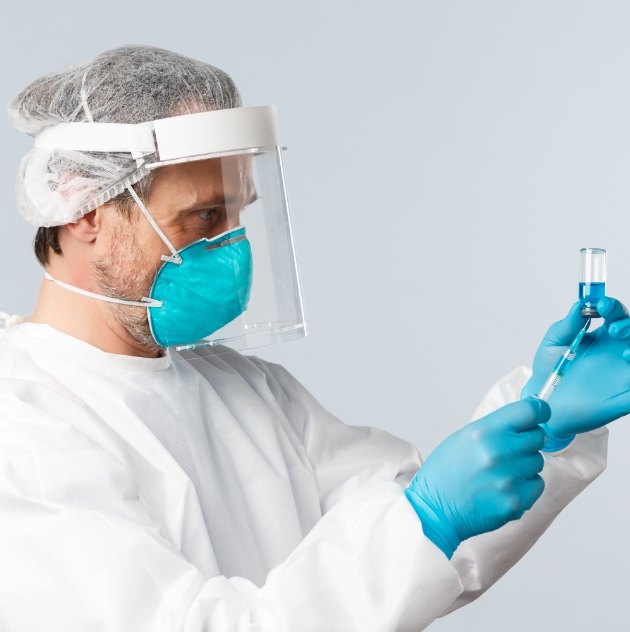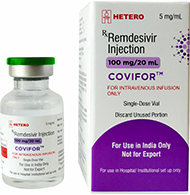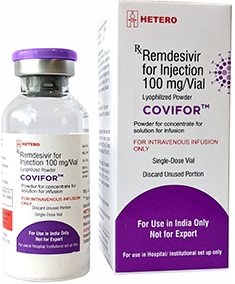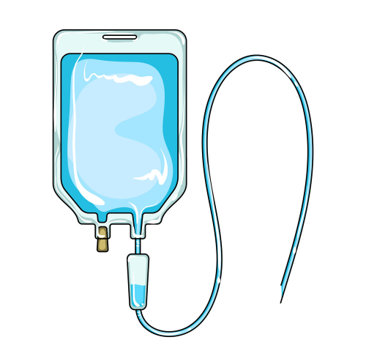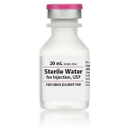Dosage And Administration
General Information
- The optimal dosing and duration of treatment is unknown. The suggested dose and duration
may be updated as data from clinical trials becomes available.
- Adult and pediatric patients (>28 days old) must have an eGFR determined and full-term
neonates (≥7 days to ≤28 days old) must have serum creatinine determined
before dosing of remdesivir.
- Hepatic laboratory testing should be performed in all patients prior to
starting remdesivir and daily while receiving remdesivir.
- Remdesivir should be administered via intravenous (IV) infusion only. Do not administer
as an intramuscular (IM) injection.
Adult Patients
| Dosage in adult and pediatric patients |
Loading dose on Day 1 via IV infusion |
Maintenance dose from Day 2-5 via IV infusion |
| Body weight 40 kg and higher |
200 mg |
100 mg |
Extension of administration of drug beyond 5 days to 10 days is not recommended.
Pediatric Patients
Dosing in pediatric patients is based upon physiologically based pharmacokinetic (PBPK) modeling and
simulation of pharmacokinetic data from healthy adult subjects.
| Body Weight |
Recommended dosage form |
Loading dose on Day 1 via IV infusion |
Maintenance dose from Day 2-5 via IV infusion |
| 3.5 kg to <40 kg |
Remdesivir Lyophilized Powder for injection only |
5 mg/kg |
2.5 mg/kg |
| 40 kg and higher |
Remdesivir Lyophilized Powder for Injection or Remdesivir Injection Solution |
200 mg |
100 mg |
Extension of administration of drug beyond 5 days to 10 days is not recommended.
- Use of the adult dose in these pediatric patients is expected to maintain exposures of
both remdesivir and the nucleoside analog GS-441524 generally within the expected adult
steady-state exposure range following administration of the adult therapeutic dosage
regimen in healthy volunteers (N=20 Study GS-406 US-399-5505).
- Use of this weight-based dosing regimen is expected to maintain remdesivir exposure that
is comparable to that observed in adults while limiting the exposure of the nucleoside
analog GS-441524 in very young children.
Pediatric patients (>28 days old) must have an eGFR determined and full-term neonates (≥7
days to ≤28 days old) must have serum creatinine determined before dosing.
Hepatic laboratory testing should be performed in all patients prior to starting remdesivir
and daily while receiving remdesivir dosing.
Use in special population
Pregnancy
No adequate and well-controlled studies of remdesivir use in pregnant women have been
conducted. Remdesivir should be used during pregnancy only if the potential benefit
justifies the potential risk for the mother and the fetus. In nonclinical reproductive
toxicity studies, remdesivir demonstrated no adverse effect on embryofetal development when
administered to pregnant animals at systemic exposures (AUC- Area Under the Curve) of the predominant circulating
metabolite of remdesivir (GS-441524) that were 4 times (rats and rabbits) the exposure in
humans at the recommended human dose (RHD).
Remdesivir was administered via intravenous injection to pregnant rats and rabbits (up to 20
mg/kg/day) on Gestation Days 6 through 17, and 7 through 20, respectively, and also to rats
from Gestation Day 6 to Lactation/Postpartum Day 20. No adverse effects on embryo-fetal
(rats and rabbits) or pre/postnatal (rats) development were observed in rats and rabbits at
nontoxic doses in pregnant animals. During organogenesis, exposures to the predominant
circulating metabolite (GS-441524) were 4 (rats and rabbits) times higher than the exposure
in humans at the RHD. In a pre/postnatal development study, exposures to the predominant
circulating metabolite of remdesivir (GS-441524) were similar to the human exposures at the
RHD.
Nursing Mothers
There is no information regarding the presence of remdesivir in human milk, the effects on
the breastfed infant, or the effects on milk production. In animal studies, remdesivir and
metabolites have been detected in the nursing pups of mothers given remdesivir, likely due
to the presence of remdesivir in milk. Because of the potential for viral transmission to
SARS CoV-2-negative infants and adverse reactions from the drug in breastfeeding infants,
the developmental and health benefits of breastfeeding should be
considered along with the mother's clinical need for remdesivir and any potential adverse
effects on the breastfed child from remdesivir or from the underlying maternal condition.
Remdesivir and its metabolites were detected in the plasma of nursing rat pups, likely due
to the presence of remdesivir and/or its metabolites in milk, following daily intravenous
administration of remdesivir to pregnant mothers from Gestation Day 6 to Lactation Day 20.
Exposures in nursing pups were approximately 1% that of maternal exposure on lactation day
10.
Hepatic Impairment
It is not known if dosage adjustment is needed in patients with hepatic impairment and
remdesivir should only be used in patients with hepatic impairment if the potential benefit
outweighs the potential risk. Hepatic laboratory testing should be performed in all patients
prior to starting remdesivir and
daily while receiving remdesivir.
Renal Impairment
Use of remdesivir in patients with renal impairment are based on potential risk and potential
benefit considerations. Patients with eGFR greater than or equal to 30 mL/min are reported
to have received remdesivir for treatment of COVID-19 with no dose adjustment of remdesivir.
All patients must have an eGFR determined before dosing. Remdesivir is not recommended in
adults and pediatric patients (>28 days old) with eGFR less than 30 mL per minute or in
full-term
neonates (≥7 days and ≤28 days old) with serum
creatinine clearance ≥1 mg/dL unless the potential benefit outweighs the potential risk.
Pediatric population
The safety and effectiveness of remdesivir for treatment of COVID-19 have not been assessed
in pediatric patients. Dosing instructions for pediatric patients were derived based on
pharmacokinetic data from adult healthy volunteers and in vitro data for remdesivir and
other similar compounds, as part of the PBPK modeling and simulation approach which accounts
for age dependent changes in metabolism, distribution, and elimination of remdesivir.
Pediatric patients (>28 days) must have creatinine clearance determined and full-term
neonates (≥7 days to ≤28 days) must have serum creatinine determined before dosing.
Pediatric patients should be monitored
for renal function and consideration given for stopping therapy in the setting of
substantial decline. The use of remdesivir is not recommended in pediatric patients (>28
days old) with eGFR < 30 mL/min and in full-term neonates (≥7 days and ≤28 days old) with
serum creatinine clearance ≥1 mg/dL unless the potential benefit outweighs the potential
risk. Because the excipient sulfobutylether-β-cyclodextrin sodium salt (SBECD) is
renally cleared and accumulates in patients with decreased renal function,
administration of drugs formulated with SBECD (such as remdesivir) is not recommended in
adults and pediatric patients (>28 days
old) with eGFR less than 30 mL per minute or in full-term neonates (≥7 days and ≤28 days
old) with serum creatinine clearance ≥1 mg/dL unless the potential benefit outweighs the
potential risk.
Geriatric Population
The pharmacokinetics of remdesivir have not been evaluated in patients >65 years of age. In
general, appropriate caution should be exercised in the administration of remdesivir and
monitoring of elderly patients,
reflecting the greater frequency of decreased hepatic, renal, or cardiac function, and of
concomitant disease or other drug therapy.
Dose preparation and administration
COVIFOR Remdesivir Injection 100 mg/20 mL (5 mg/mL) Solution

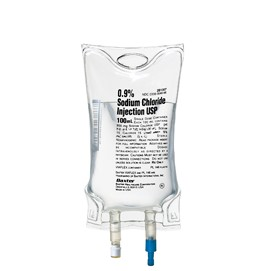
Dilute with 0.9 % saline*

Ready to infuse
Care should be taken during admixture to prevent inadvertent microbial contamination. As there is no preservative or bacteriostatic agent present in this product, aseptic technique must be used.
*Prior to dilution, equilibrate remdesivir injection to room temperature (20°C to 25°C)
Recommended remdesivir solution dilution instructions in adults and pediatric patients
weighing ≥40kg
| Remdesivir Dose |
0.9% saline infusion bag volume to be used |
Volume of saline to be withdrawn and discarded from 0.9% saline infusion bag |
Required volume of remdesivir injection solution |
| 200 mg(2 vials) |
250 mL |
40 mL |
2 x 20 mL |
| 100 mg(1 vial) |
20 mL |
20 mL |
Recommended rate of infusion for diluted remdesivir solution in adults and pediatric patients
weighing ≥40kg
| Infusion bag volume |
Infusion time |
Rate of infusion |
| 250 mL |
30 min |
8.33 mL/min |
| 60 min |
4.17 mL/min |
| 120 min |
2.08 mL/min |

Infused intravenously over 30 to 120 minutes
COVIFOR Remdesivir for Injection 100 mg/ Vial Lyophilized powder
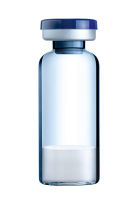
Remdesivir 100 mg Lyophilized Powder
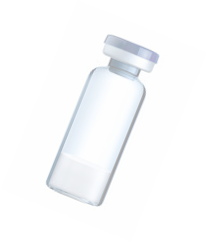

Shake the vial for 30 seconds. Allow the contents to settle for 2 to 3 minutes. A
clear solution
should result.*


Dilute with 0.9 % saline*

Ready to infuse
Care should be taken during admixture to prevent inadvertent microbial contamination. As there is no preservative or bacteriostatic agent present in this product, aseptic technique must be used.
*If the contents of the vial are not completely dissolved, shake the vial again for 30 seconds and allow the contents to settle for 2 to 3 minutes. Repeat this procedure as necessary until the contents of the vial are completely dissolved.
Adults and pediatric patients weighing ≥ 40 kg
Recommended dilution instructions – Remdesivir for injection lyophilized powder in Adults and pediatric patients weighing ≥ 40 kg
| Remdesivir dose |
0.9% saline infusion bag volume to be used |
Volume of saline to be withdrawn and discarded from 0.9% saline infusion bag |
Required volume of reconstituted remdesivir for injection |
| 200 mg (2 vials) |
250 mL |
40 mL |
2 x 20 mL |
| 100 mL |
40 mL |
2 x 20 mL |
| 100 mg (1 vial) |
250 mL |
20 mL |
20 mL |
| 100 mL |
20 mL |
20 mL |
Recommended rate of infusion – Diluted remdesivir for injection lyophilized powder in adults and pediatric patients weighing ≥ 40 kg
| Infusion bag volume |
Infusion time |
Rate of infusion |
| 250 mL |
30 min |
8.33 mL/min |
| 60 min |
4.17 mL/min |
| 120 min |
2.08 mL/min |
| 100 mL |
30 min |
3.33 mL/min |
| 60 min |
1.67 mL/min |
| 120 min |
0.83 mL/min |
Pediatric patients weighing 3.5 Kg to < 40 kg
Recommended rate of infusion for pediatric patients weighing 3.5 Kg to < 40 kg
| Infusion bag volume |
Infusion time |
Rate of infusion* |
| 100 mL |
30 min |
3.33 mL/min |
| 60 min |
1.67 mL/min |
| 120 min |
0.83 mL/min |
| 50 mL |
30 min |
1.67 mL/min |
| 60 min |
0.83 mL/min |
| 120 min |
0.42 mL/min |
| 25 mL |
30 min |
0.83 mL/min |
| 60 min |
0.42 mL/min |
| 120 min |
0.21 mL/min |
Rate of infusion may be adjusted based on total volume to be infused

Infused intravenously over 30 to 120 minutes
Drugs that should not be co-administered with remdesivir
| Category |
COVID-19 Antivirals |
Antibacterials |
Anticonvulsants |
Antidepressants |
| Drugs |
Chloroquine, Hydroxychloroquine |
Rifampicin, Rifapentine |
Carbamazepine, Phenobarbital (phenobarbitone), Phenytoin, Primidone |
St. John's wort |
There are some medications out there that will boost the Remdesivir level in bloodstream, and
some that will reduce it.
Some antibiotics, anticonvulsants, and even herbal products may do this, which include
Clarithromycin, Rifampin, Phenytoin, Phenobarbital, St. John's Wort
No in vivo interaction studies have been performed, but the ability of the parent compound
remdesivir to inhibit CYP enzymes and transporters,
as well it's the inducing capacity, has been tested in vitro. For remdesivir, the regulatory
cut off,
50 X Cmax(unbound) is 54.6 μM based on a Cmax of 5440 ng/ml (loading dose) and 12 % fraction
unbound.
CYP Inhibition/ CYP induction
The potential for remdesivir to inhibit CYP enzymes was evaluated using human hepatic
microsomes and monitoring
specific CYP-mediated transformations of probe substrates. Remdesivir was a weak inhibitor
of
CYP1A2, CYP2C9, CYP2C19, and CYP2D6. Remdesivir had an IC50 for CYP3A of 1.6 μM.
The potential of induction of CYP enzymes (CYP1A2, CYP2B6, and CYP3A4) following exposure of
human hepatocytes to remdesivir,
and its major systemic metabolites, GS-704277 and the nucleoside analog GS-441524,
was assessed by quantitating messenger RNA (mRNA) levels and CYP enzyme activities.
In hepatocytes from 1 of the 3 donors, remdesivir showed induction of mRNA levels of CYP1A2
and CYP2B6 by 5.7-fold and 5.4-fold,
respectively. Such induction was not observed in hepatocytes from the other 2 donors.
Remdesivir showed no induction of CYP3A4 mRNA or CYP3A4/5 activity. GS-441524 and GS-704277
showed no induction of CYP enzymes
tested in the study.
-
Dexamethasone and Remdesivir - Use with caution.
Dexamethasone is a substrate of CYP3A4 and a moderate inducer of this enzyme. Due to
remdesivir's rapid clearance,
although remdesivir inhibits CYP3A4 it is unlikely to have a significant effect on
dexamethasone.
Dexamethasone can potentially reduce remdesivir concentrations due to induction of
CYP3A4.
Transporter substrate/ Transporter Inhibition
Remdesivir was found to be a substrate for OATP1B1 but not for OATP1B3. Remdesivir was
assessed as a substrate for the efflux transporters
Pglycoprotein (P-gp) and breast cancer resistance protein (BCRP).
Remdesivir was found to be a substrate for P-gp but not BCRP. In cells overexpressing human
organic anion transporters (OAT) 1 and 3,
no evidence for transport of remdesivir and its major systemic metabolites,
GS-704277 and the nucleoside analog GS-441524, was observed.
The potential for remdesivir to inhibit drug transporters was assessed in vitro in
transfected cell lines expressing OATP1B1,
OATP1B3, P-gp, and BCRP. Remdesivir did not inhibit P-gp at the highest concentration tested
(40 μM), but inhibited OATP1B1- and OATP1B3 with IC50 values of 2.8 and 2.1 μM,
respectively.
Remdesivir inhibited BSEP-, MRP4- and NTCP-mediated probe substrate transport, with
calculated IC50 values of 22, 5.1, and 72 μM, respectively.
No interaction of remdesivir with MRP2 was observed at up to 100 μM. The major metabolite
GS-704277 showed 25% and 44% inhibition of
MRP2- and NTCP-mediated transport, respectively, at the 100 μM test concentration Whereas no
interaction with BSEP or MRP4 was observed.
The nucleoside metabolite GS-441524 showed 24% inhibition of NTCP mediated transport at the
100 μM test concentration,
but no interaction with BSEP, MRP2, or MRP4 was observed.
Clinical Data For Remdesivir
Study 1: SIMPLE STUDY
Remdesivir for 5 or 10 Days in Patients with Severe Covid-19
Study design and dosage: Phase 3, open-label, trial evaluating 5-day
and 10-day
dosing durations of the investigational antiviral remdesivir in hospitalized
patients with
severe manifestations of COVID-19 disease.
The initial phase of the study randomized 397 patients in a 1:1 ratio to receive
remdesivir
200 mg on the first day, followed by remdesivir 100 mg each day until day 5 or 10,
administered intravenously, in addition to standard of care.
Results: As per initial study data published on April 29th demonstrates
following
- Similar clinical improvement in patients receiving a 10-day or 5-day treatment
course of
remdesivir (Odds Ratio: 0.75 on Day 14).
- Key efficacy and safety results from the study are included in the table below.
|
5-Day Remdesivir n=200 |
10-Day Remdesivir n=197 |
Baseline adjusted p-value1 |
| Clinical Efficacy Outcomes at Day 14 |
| ≥ 2-point improvement in ordinal scale |
129 (65) |
107 (54) |
0.16 |
| Clinical recovery |
129 (65) |
106 (54) |
0.17 |
| Discharge |
120 (60) |
103 (52) |
0.44 |
| Death |
16 (8) |
21 (11) |
0.70 |
| Safety |
| Any adverse event (AE) |
141 (71) |
145 (74) |
0.86 |
| Grade ≥3 study drug-related AE |
8 (4) |
10 (5) |
0.65 |
| Study drug-related serious adverse event (SAE) |
3 (2) |
4 (2) |
0.73 |
| AE leading to discontinuation |
9 (5) |
20 (10) |
0.07 |
1 Adjusted for baseline clinical status
- In an exploratory analysis, by day 14 remdesivir administered within 10 days of
symptom
onset had improved outcomes (62 %) compared to after more than 10 days of
symptoms (42
%).
An expansion phase: Additional 5,600 patients, including patients on
mechanical
ventilation. 180 trial sites around the world, including sites in the United States,
China,
France, Germany, Hong Kong, Italy, Japan, Korea, the Netherlands, Singapore, Spain,
Sweden,
Switzerland, Taiwan and the United Kingdom.
Second SIMPLE trial: Evaluating the safety and efficacy of 5-day and
10-day
dosing durations of remdesivir administered intravenously in patients with moderate
manifestations of COVID-19, compared with standard of care. The results from the
first 600
patients of this study are expected at the end of May.
Study 2: The Adaptive COVID-19 Treatment Trial (ACTT-1)
Remdesivir for the Treatment of Covid-19 — Preliminary Report
Methods: A double-blind, randomized, placebo-controlled trial of
intravenous
remdesivir in adults hospitalized with Covid-19 with evidence of lower respiratory
tract
involvement. Patients randomly received either remdesivir (200 mg loading dose on
day 1,
followed by 100 mg daily for up to 9 additional days) or placebo for up to 10 days.
Primary outcome: Time to recovery, defined by either discharge from the
hospital
or hospitalization for infection-control purposes only.
Results: A total of 1063 patients underwent randomization.
- Preliminary results from the 1059 patients (538 remdesivir and 521 placebo)
- Median recovery time for Remdesivir of 11 days (95% confidence interval [CI], 9
to 12),
as compared with 15 days (95% CI, 13 to 19) in those who received placebo (rate
ratio
for recovery, 1.32; 95% CI, 1.12 to 1.55; P< 0.001).
- The Kaplan-Meier estimates of mortality by 14 days were 7.1% with remdesivir and
11.9%
with placebo (hazard ratio for death, 0.70; 95% CI, 0.47 to 1.04).
- Serious adverse events were reported for 114 of the 541 patients in the
remdesivir group
(21.1%) and 141 of the 522 patients in the placebo group (27.0%).
Conclusions: Remdesivir was superior to placebo in shortening the time
to
recovery in adults hospitalized with Covid-19 and evidence of lower respiratory
tract
infection.
Study 3:
Remdesivir in adults with severe COVID-19: a randomised, double-blind,
placebo-controlled, multicentre trial
Methods: A randomised, double-blind, placebo-controlled, multicentre
trial at
ten hospitals in Hubei, China.
Inclusion criteria: Adults (aged ≥18 years) admitted to hospital with
laboratory-confirmed SARS-CoV-2 infection, with an interval from symptom onset to
enrolment
of 12 days or less, oxygen saturation of 94% or less on room air or a ratio of
arterial
oxygen partial pressure to fractional inspired oxygen of 300 mm Hg or less, and
radiologically confirmed pneumonia.
Dosage: Patients were randomly assigned in a 2:1 ratio to intravenous
remdesivir
(200 mg on day 1 followed by 100 mg on days 2–10 in single daily infusions) or the
same
volume of placebo infusions for 10 days.
Patients were permitted concomitant use of lopinavir–ritonavir, interferons, and
corticosteroids.
The primary endpoint: Was time to clinical improvement up to day 28,
defined as
the time (in days) from randomisation to the point of a decline of two levels on a
six-point
ordinal scale of clinical status (from 1=discharged to 6=death) or discharged alive
from
hospital, whichever came first.
Results: Between Feb 6, 2020, and March 12, 2020, 237 patients were
enrolled and
randomly assigned to a treatment group (158 to remdesivir and 79 to placebo);
- Remdesivir use was not associated with a difference in time to clinical
improvement
(hazard ratio 1.23 [95% CI 0.87–1.75]).
- Although not statistically significant, patients receiving remdesivir had a
numerically faster time to clinical improvement than those receiving placebo
among
patients with symptom duration of 10 days or less (hazard ratio 1.52
[0.95–2.43]).
- Adverse events were reported in 102 (66%) of 155 remdesivir recipients versus 50
(64%)
of 78 placebo recipients.
- Remdesivir was stopped early because of adverse events in 18 (12%) patients
versus
four (5%) patients who stopped placebo early.
Conclusion: In adult patients admitted to hospital for severe COVID-19,
remdesivir was not associated with statistically significant clinical benefits.
However, the
numerical reduction in time to clinical improvement in those treated earlier
requires
confirmation in larger studies.
Study 4:
Remdesivir in Treatment of COVID-19: A Systematic Benefit-Risk
Assessment
Aim: Provide a platform for a dynamic systematic benefit-risk
evaluation, which
starts with inevitably limited information (to meet the urgent unmet public health
need
worldwide), then update the benefit-risk evaluation as more data become available.
Methods: The Benefit-Risk Action Team (BRAT) framework was used to
assess the
overall benefit-risk of the use of remdesivir as a treatment for COVID-19 compared
with
standard of care, placebo or other treatments.
PubMed, Google Scholar and government agency websites were searched to identify
literature
reporting clinical outcomes in patients taking remdesivir for COVID-19. A value tree
was
constructed and key benefits and risks were ranked by two clinicians in order of
considered
importance.
Results: Using the BRAT method, following key benefits and risks for use
of
remdesivir in COVID-19 compared with placebo were identified.
- The benefit of time to clinical improvement was not statistically significant
(21 vs 23
days, HR 1.23, 95% CI 0.87-1.75), although the study was underpowered.
- A shorter time to recovery in patients treated with remdesivir was observed (11
vs 15
days), with non-significant reduced mortality risk (8% vs 12%).
- Fewer serious adverse events in patients taking remdesivir (18%) compared with
the
placebo group (26%); however, more patients in the remdesivir group discontinued
treatment as a result of an adverse event compared with those patients receiving
placebo
(12% vs 5%).
Conclusions: Preliminary clinical trial results suggest that there may
be a
favourable benefit-risk profile for remdesivir compared with placebo in severe
COVID-19
infection and further data on benefits would strengthen this evaluation.
BCRP: Breast Cancer Resistance Protein; BSEP : Bile Salt Export Pump;
MRP : Multidrug Resistance Protein; NTCP : Sodium Taurocholate
Cotransporting Polypeptide;
OAT : Organic Anion Transporters; eGFR - Estimated Glomerular Filtration
Rate; LFT - Liver Function Tests;
AST- Aspartate Aminotransferase; ALT – Alanine Aminotransferase
References:
1. COVIFOR, DCGI product permission, dated 20.06.2020
2. COVIFOR, package insert (accessed on 31.07.2020)
3. https://www.covid19-druginteractions.org/checker# (accessed on 24/06/2020)
4. Fact sheet for healthcare providers – Emergency Use Authorization (EUA) of remdesivir
(GS-5734™) (accessed on 31/07/2020)
5. Dexamethasone in the treatment of COVID-19, From the UK CMOs and Medical Director of NHS
England. Published on 16 June 2020.
6.
https://www.gilead.com/news-and-press/press-room/press-releases/2020/4/gilead-announces-results-from-phase-3-trial-of-investigational-antiviral-remdesivir-in-patients-with-severe-covid-19
(accessed on 30/05/2020)
7. Goldman JD, Lye DCB et al. Remdesivir for 5 or 10 Days in Patients With Severe Covid-19. N
Engl J Med. 2020 May 22.
8. Beigel JH, Tomashek KM et al. Remdesivir for the Treatment of Covid-19 — Preliminary
Report. May 22, 2020, at NEJM.org
9. Davies M, Osborne V, et al. Remdesivir in Treatment of COVID-19: A Systematic Benefit-Risk
Assessment. Drug Saf. 2020 May 28. (accessed on 30/05/2020)
10.
https://www.gilead.com/news-and-press/press-room/press-releases/2020/5/gilead-announces-approval-of-veklury-remdesivir-in-japan-for-patients-with-severe-covid19
(accessed on 30/05/2020)


